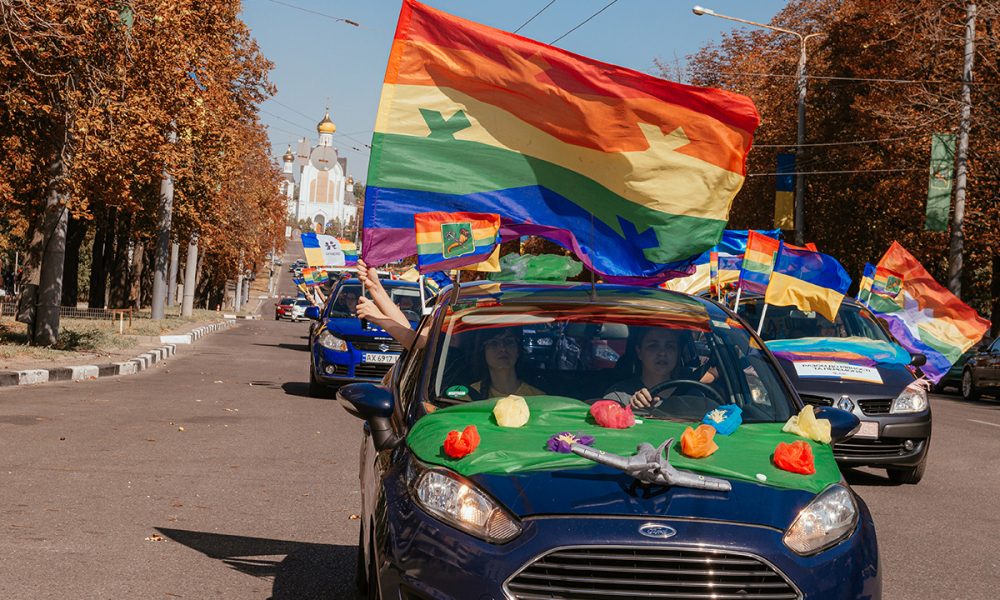Trump’s Approach To Ukraine Poses Major Risks To Lgbtq Community

Feb. 23 marks three years since Russia began its full-scale attack on my home country, Ukraine. I haven’t been in Ukraine for more than 10 years, and I spent almost all those years in LGBTQ activism.
I was barely an adult when my family left my hometown, Donetsk, after the declaration of the so-called Donetsk People’s Republic by Russian puppet separatists in 2014.
So many things have changed since then—my school friend was barely able to escape the Mariupol bombings together with two little children. Small cities in the Donetsk region that were barely known to outsiders and were places of my father’s business trips turned into battlefields frequently mentioned in international news. And all my queer acquaintances except for one left Ukraine.
This revealed how the world has shifted into globalization and how LGBTQ rights are used as bargaining chips in political debates, and now the fate of LGBTQ Ukrainians is partly dependent on the U.S.
Because Russian officials were using LGBTQ people as a symbol of everything “immoral” and “Western,” they used LGBTQ people in their war propaganda both against the U.S. and against Ukraine. For example, the leader of the state-supported Russian Orthodox Church, Patriarch Kirill of Moscow, stated in 2022 that the war in Ukraine happened because “people in Donetsk do not want Gay Prides” as a justification for the war, and that the gay Prides are the ultimate test that the Americans and the West are using to find out whether Ukrainians are ready to abandon “Russian traditional values.”
But when I asked a transgender person, L., who was living in Donetsk between 2014 and 2022, they explained that they do not face transphobic challenges that many queer people face in Russia, and the younger generation in Donetsk was pretty much LGBTQ friendly. Even Russian puppet forces didn’t care much about LGBTQ people back in those days.
A majority 58% of Ukrainians hold neutral or positive attributes toward their LGBTQ citizens, according to recent polling.
The LGBTQ phobia wasn’t something that the Donetsk people were willing to protect with their lives; it was something that Russians used in their propaganda war to justify the invasion and killing of Ukrainian civilians, including children.
For a long time, Russia labelled LGBTQ organizations as “Western agents” and used anti-American rhetoric in their homophobic propaganda.
But there was actual help that the Ukrainian LGBTQ community received from the U.S., not because of some kind of conspiracy, but because of humanitarian reasons, because Russian state propaganda and the Soviet anti-LGBTQ legacy made it hard for LGBTQ Ukrainians to find financial support for community activism.
On the anniversary of the war, I spoke with Igor, a Ukrainian lawyer born in Donetsk, political analyst, and expert on the American-Ukrainian relationship, currently based in Vienna, about how MAGA and the current American political situation influence LGBTQ people in war-torn Ukraine.
“U.S. support, particularly through USAID and other grant programs, has been essential to sustaining services for LGBTQ individuals in Ukraine” Ihor explained. “Without it, many of these services—like specialized shelters, emergency housing, HIV counseling, and psychological support—would disappear. For instance, shelters in cities like Dnipro and Chernivtsi that offer safe places for LGBTQ people escaping war zones exist largely thanks to international donor funding.
USAID has backed public outreach and education initiatives aimed at fostering open dialogue on LGBTQ issues, which in turn helps combat anti-LGBTQ propaganda. If USAID’s programs were dismantled, we would see an immediate and severe impact: safe spaces could close, mental health support could end, and marginalized groups would be left even more vulnerable. Essentially, the destruction of this aid framework would roll back critical progress and expose the LGBTQ community to greater risks with fewer avenues for help.
To compensate for these losses, pro-LGBTQ NGOs would need to seek alternative funding sources from private donors—such as the Open Society Foundations—or EU-based donors. However, it remains uncertain whether those sources can fully replace the scale and consistency of current USAID-backed programs. Essentially, the destruction of this aid framework would roll back critical progress and expose the LGBTQ community to greater risks with fewer avenues for help.”
At the same time, LGBTQ people in Ukraine are now facing much more grave danger because of current American politics.
President Donald Trump told reporters that it is unlikely that Ukraine would return to its pre-2014 borders, hinting that Ukraine needs to sacrifice the Crimea and Donbas regions—including my hometown, Donetsk. This plan was also promoted by the American delegation at the Munich Security Conference on Feb. 14-16.
Meanwhile, situations with LGBTQ rights in Donetsk worsened. For example, my attempt to find open LGBTQ people in Russian-controlled Donetsk for one of my articles ended with a comment from my bisexual non-binary friend Roman, who told me that LGBTQ people in Donetsk are now avoiding getting in contact with outsiders because they are scared of “fake dates,” when thugs or occupational security forces pretend to be LGBTQ-friendly journalists, physiologists, or potential partners to lure a queer person into a trap. LGBTQ people in Donetsk couldn’t speak openly about their sexual orientation and gender identity.
“In occupied areas like Kherson and Crimea, Russian authorities have specifically targeted LGBTQ+ individuals,” explained Ihor, and a Trump deal could make everything even worse, making it permanent. “The MAGA approach to Russia-Ukraine relations under Trump poses significant risks to Ukraine’s LGBTQ community. If MAGA policies lead to territorial concessions or normalization of Russian control over parts of Ukraine, LGBTQ individuals in those areas would face severe repression under Russian law. Russia’s “gay propaganda” laws criminalize public expressions of LGBTQ identity and advocacy. In previously occupied regions like Crimea and Donbas, there have been documented cases of violence, arrests, and forced disappearances targeting LGBTQ individuals under Russian rule”
Indeed, it’s true. For example, the Russian-occupied Chechnya, an official Russian administration government ruled by Ramzan Kadyrov, is hunting LGBTQ people as part of a mass-terror campaign.
Chechnya has always been a quite conservative region compared to Western Europe; sexuality and gender identity wasn’t something that was widely discussed in independent Chechnya after the Soviet Union collapsed, before Russia attacked the self-proclaimed Chechen Republic of Ichkeria in 1994. It was a private and family matter, but after 400 years of Chechen anti-colonial fighting, Russians decided to break resistance by destroying the whole idea of a private life. Only after Russia got Chechnya under its control, a mass-terror campaign against LGBTQ people began, and sometimes even non-LGBTQ people were framed as “gay,” tortured, and killed.
The Russian administration in Chechnya was actively hunting dissidents and even their relatives, or just accidental young men who could be framed as terrorist supporters, separatists or spies for better “crime detection” statistics or to be sent to the war in Ukraine as a “Russian” cannon fodder.
The same could happen not just with LGBTQ Ukrainians, but with any open-minded and independently thinking Ukrainians in Donbas and Crimea if Ukraine is forced by the United States to sacrifice territories.
It is possible that it’s up to Americans now to stop their government and to help Ukrainian LGBTQ people save themselves from persecution and extermination.
The post Trump’s approach to Ukraine poses major risks to LGBTQ community appeared first on Washington Blade: LGBTQ News, Politics, LGBTQ Rights, Gay News.


